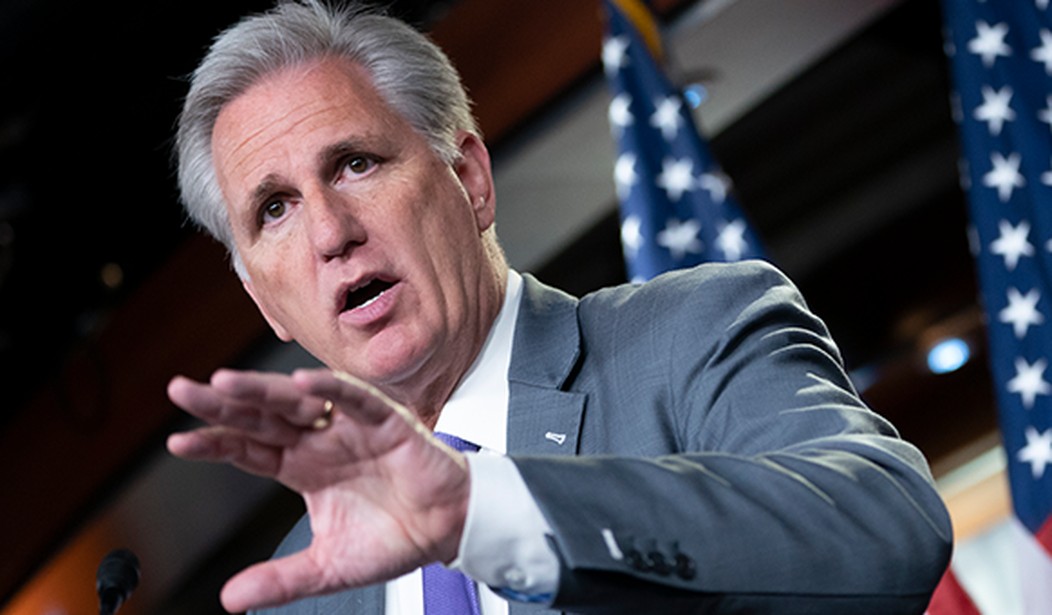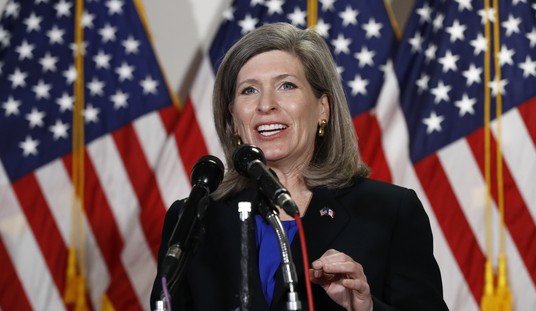Lots and lots of media tongue-clucking over this move from Kevin McCarthy, but Politico raised the same issues in what turned out to be a curtain-raiser this morning. Furthermore, the House Minority Leader raised these objections last week, after claiming to have been blindsided by the announcement of a deal on the commission to investigate the January 6 riot at the Capitol.
This started on Friday, when negotiators from both House caucuses put together a deal on the bipartisan commission. The GOP team was led by Rep. John Katko (R-NY), who was handpicked by McCarthy for the task. The final form of the commission addressed complaints about Nancy Pelosi’s proposal. It gave both parties equal representation, and allowed party leaders to choose the chair (Democrat) and vice-chair (Republican):
House Homeland Security Chairman Bennie Thompson, D-Miss., said in a news release that he had reached a deal with committee ranking member Rep. John Katko, R-N.Y., on creating a panel styled after the 9/11 Commission to study “the facts and circumstances of the January 6th attack on the Capitol as well as the influencing factors that may have provoked the attack on our democracy.”
The proposed 10-person commission will include five members, including a chair, appointed by House Speaker Nancy Pelosi, D-Calif., and Senate Majority Leader Chuck Schumer, D-N.Y., with the other five, including a vice chair, appointed by House Minority Leader Kevin McCarthy, R-Calif., and Senate Minority Leader Mitch McConnell, R-Ky., the release said.
That, however, was where the problems began. McCarthy immediately objected, saying he had not even been consulted on the press release, let alone the final form of the agreement:
But moments after Thompson’s announcement, McCarthy said he had not approved the proposal, telling reporters that he wasn’t even aware the press release was going to be sent Friday morning.
“That’s very concerning to me,” McCarthy said in response to being told that the commission would be limited in scope to the Jan. 6 riot.
“You’ve got to look at what the build-up before and what has gone on afterwards, otherwise the commission does not work,” he said. He also accused Pelosi of having “played politics with this for a number of months.”
McCarthy claimed that Katko had told him the scope would be broader, including a review of all political violence in 2020, which had reached levels not seen since the 1970s. McCarthy and other Republicans — notably in the Senate, as we’ll shortly see — wanted the scope to include the entirety of violence, not just on one day. Democrats wanted it limited to just the riot, which is perhaps understandable as that riot falls entirely within their jurisdiction. Republicans saw the commission as a tool for Democrats to beat the GOP over the riot while escaping any criticism over riots in the streets of American cities all summer and fall. Both sides are strategizing and both sides have a point, but only one side got anything from it at all.
McCarthy made good on his anger this morning:
.@GOPLeader McCarthy officially comes out against the Jan. 6 commission bill, which was negotiated and signed off on by one of his members: pic.twitter.com/qzn89zPqlZ
— Phil Mattingly (@Phil_Mattingly) May 18, 2021
With media figures accusing McCarthy of reversing himself, the context is important. It might not be the correct call, but McCarthy made it clear immediately that he was opposed to the form that negotiators built. Today’s statement is consistent with McCarthy’s position all along, regardless of what one thinks about it.
And, as Politico also makes clear, this form of a commission has a slim-to-none chance of moving forward in the Senate anyway:
Several Senate Republicans on Monday evening expressed worries about how the commission will be formed, whether it should have a broader scope and if it might hinder the work of congressional committees that are already probing the pro-Trump riot at the Capitol. With the use of the filibuster power, the Senate GOP can demand changes or bottle up the legislation altogether.
“They’re going to have to broaden the inquiry in order to get 60 votes,” said Sen. Chuck Grassley (R-Iowa). “There’s more things wrong in this country than just [what] happened on January 6th.” …
Sen. Roy Blunt (R-Mo.), the top Republican on the Senate Rules Committee and the No. 4 GOP leader, said that he believes a commission could get in the way of Congress’s ongoing inquiry into why the police response was inadequate during the riot. Blunt believes the structure of the U.S. Capitol Police hindered an effective response and that Congress needs to change its governance.
“The commission will slow us down from some of the things we need to do with the Capitol Police and police board,” Blunt said. “I’ll look at what they do but I’m no fan of the commission, which on this topic I think will slow down getting to the decisions that we all know we need to make.”
Note well that McCarthy is echoing these same criticisms in his statement. This sounds a bit like Katko got rolled in the negotiations. Republicans have insisted on a broader scope all along, as well as parity in representation on the commission. In an evenly divided Congress, it seems a bit strange to have offered that concession to Democrats, especially without consulting McCarthy or other GOP leaders, as seems to have happened here.
At this point, one has to wonder whether Blunt’s correct. The better part of the narrower scope of this commission have already been parsed out to standing committees in Congress. Duplicating that effort would be counterproductive, even if duplication and redundancy are also long traditions on Capitol Hill. A commission with a broader scope would be of better use, but Democrats apparently aren’t as interested in the broader look at political violence in the 2020 cycle.







Join the conversation as a VIP Member